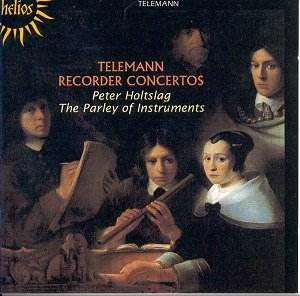Georg Philipp Telemannís life was contemporary with
the rise and decline in popularity of the Baroque recorder. It is possible
that he played this instrument; of all German composers, he wrote the
most music for it. His music is said to be extremely idiomatic for the
instrument, and it appears in hundreds of his works.
This disc features four works for orchestra and recorder.
Calling it "Recorder Concertos" is not really accurate, since
it contains two concertos, one suite and a sinfonia, but the recorder
is indeed the featured instrument in these works. It should be noted
that the instrument used here has a rich, complex sound; this is a Baroque
recorder, which is different from the harsher, shriller Renaissance
recorder.
The A minor Suite, at over 30 minutes long, takes up
about half of this disc. Its very first notes bear witness to its French
influence; it is a suite in the French form, following the various dance
movements used traditionally in this type of work. This large-scale
work is similar to Bachís orchestral suites, and is said to be, for
recorder players, the equivalent of the Bachís B minor suite for flautists.
Telemannís suite combines the Italian solo concerto style with the French
suite form, giving the recorder a central role. The music is beautiful
- it has the drama of some French opera overtures, and the subtle structure
of Bachís orchestral works. The performance, both by Peter Holtslag
on recorder and by the entire orchestra, is very moving. Gone are the
staid tempi often heard in recordings and performances of such works;
this piece breathes energy and emotion. The orchestra is small enough
to not overpower the recorder, but large enough to give a rich, lush
sound.
The two actual recorder concertos, in F major and C
major, follow the traditional concerto form, with four movements, alternating
slow and fast tempi. While the Suite in A minor is lavish and subtle,
the F major concerto, perhaps written as early as 1708, is relatively
unsophisticated, being basically an alternation of solo and tutti passages.
The C major concerto, written much later, is a more ingenious work,
with an interesting pizzicato accompaniment for the solo recorder section
in the first movement, and a generally more modern style. This work
is far more satisfying than the F major concerto, and the recorder part
is much more interesting and difficult.
The Sinfonia in F major is a smaller-scale work that
may have belonged to a church cantata. Its scoring is somewhat unique
- it is for a recorder, a solo bass viol, strings, cornett, three trombones
and organ. The sound is rich and has a unique texture, as the wind instruments
double the strings, at times, and the continuo is played by the organ
and viol. The horns give it a bright sound, contrasted by the airy tone
of the recorder. This brief, three-movement work, is an excellent piece
to close this disc.
Some feel that Telemannís music is boring, that he
wrote a great deal of music but little of it truly had character. This
disc shows that Telemann could, indeed, compose in a variety of idioms,
even when using a specific instrument as central. This recording is
delightful: the music is wonderful, the performance excellent and the
sound exquisite.
Kirk McElhearn

![]() The Parley of Instruments,
Peter Holman
The Parley of Instruments,
Peter Holman ![]() HYPERION HELIOS CDH55091
[65.43]
HYPERION HELIOS CDH55091
[65.43]